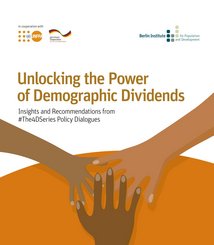
This report highlights the potential of targeted population policies to achieve demographic dividends.
Read more
At the International Conference on Population and Development (ICPD), held in Cairo in 1994, the international community agreed on the universal right to freely decide on the number and spacing of children and to receive the information and means to do so. Self-determination – especially for women – is key to sustainable development. However, progress in the area of sexual and reproductive health and rights has been slow, partly due to greater opposition to the goals of the Cairo Programme of Action (PoA). The discussion paper sets out the arguments put forward by opponents like the Vatican, evangelical Christians in the USA and "anti-choice" movements in Europe that aim to undermine implementation of the ICPD goals.
The Berlin Institute would like to thank the Dirk Rossmann GmbH for funding this project. The Berlin Institute is solely responsible for the content of this report. The Berlin Institute would also like to thank the DSW – Deutsche Stiftung Weltbevölkerung for funding the translation of the discussion paper.
Executive Director
Telefon: +49 30 - 22 32 48 45
Contact via Mail: hinz@berlin-institut.org
© Berlin-Institut
Student Assistant
Telefon: +49 30 - 22 32 48 45
Contact via Mail: engler@berlin-institut.org
© Berlin-Institut
Demographic change is not a disaster, but a challenge. Analyses and concepts are needed to master them successfully. The Berlin Institute for Population and Development provides these free of charge and makes a significant contribution to ensuring that important future issues are discussed on a broad basis and put on the political agenda. The non-profit Berlin Institute works on a non-partisan basis and receives no state funding whatsoever. Your donation therefore helps to maintain our independence and the high standard of our publications. Donations to the Berlin Institute are tax-deductible and can be made directly online using the donation button or by using a bank transfer form to the following account
Donation account
GLS Bank
IBAN DE15 4306 0967 1276 4833 00
BIC/SWIFT GENODEM1GLS
We thank you very much for your support!